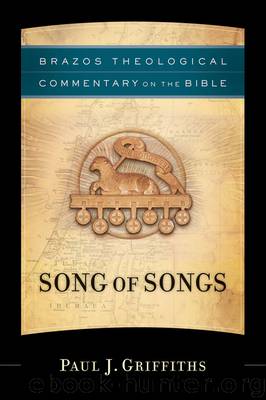Song of Songs by Griffiths Paul J

Author:Griffiths, Paul J.
Language: eng
Format: epub
Publisher: Baker Publishing Group
On the King’s Couch (1:12–14)
While the king was on his couch
my spikenard gave off its scent.
A sachet of myrrh is my delightful man for me
he lingers between my breasts;
a henna cluster is my delightful man for me
in the vineyards of Engaddi.
She responds to his words of praise to her in 1:9–11, though initially not in the voice of direct address but rather with third-person memories or anticipations of bed—she recalls that they have been “on his couch” together—and lovemaking, as in the first few verses of the Song. Naming him again as her “king,” she recalls or hopes for his lingering between her breasts, saturating her images of physical intimacy with those of sweet-scented herbs and ointments (“spikenard,” “myrrh,” “henna”). He is her “delightful man”—the one who gives her delight: again, the explicitly sexual vocabulary—but she distances him by not yet matching his vocatives and second-person verbs with her own.
She smells, she says of “spikenard” (nardus), which is, botanically speaking, a fragrant unguent derived from plants of the valerian family—usually Nardostachys grandiflora or Nardostachys grandimans. The word occurs in the Song only here and at 4:13–14, and always with reference to her pleasing and erotically exciting perfume. Nardus is rare in scripture as well, the only other occurrences being in the stories of Jesus’s anointing with it (→1:3a), at Bethany by Mary, perhaps Martha’s sister (as John 12:1–8 has it), or by an unnamed woman (as in Mark 14:1–9). In both versions of the gospel story, emphasis is placed on the expense and purity of the spikenard used, and on the connection of the anointing with Jesus’s death and burial. Spikenard is therefore used as a preparation for both sex and death; and that Jesus is anointed with it by a woman preserves and deepens its connection with the former. To anoint Jesus’s body with spikenard is to prepare it for that act of love that is his death, a preparation best done by a woman.
Gregory of Nyssa, writing at the end of the fourth century, is lyrical and suggestive on the connection between the “spikenard” of the Song and that of the Gospels:
This [the spikenard of the Gospels] is perhaps the same as the bride’s spikenard [of Song 1:12], which gave off the bridegroom’s scent. In the Gospel, it is poured out upon the Lord and fills the house with its scent. Here [in the Song] it seems to me that the woman’s spikenard foreshadows by a kind of prophetic inspiration the mystery of his [the Lord’s] death. The Lord bears witness to what she has done when he says, “She has come beforehand to bury me” [Mark 14:8]. . . . In the Song, the spikenard gives to the bride the sweet scent of the bridegroom; in the Gospel, however, the perfume that fills the whole house becomes the fragrant chrism of the whole body of the church in the entire inhabited world and in the entire cosmos.[89]
This line of interpretation—a commonplace in later patristic commentary—emphasizes not only
Download
This site does not store any files on its server. We only index and link to content provided by other sites. Please contact the content providers to delete copyright contents if any and email us, we'll remove relevant links or contents immediately.
The Five People You Meet in Heaven by Mitch Albom(3549)
The Secret Power of Speaking God's Word by Joyce Meyer(3159)
Real Sex by Lauren F. Winner(3005)
Name Book, The: Over 10,000 Names--Their Meanings, Origins, and Spiritual Significance by Astoria Dorothy(2969)
The Holy Spirit by Billy Graham(2938)
0041152001443424520 .pdf by Unknown(2842)
How The Mind Works by Steven Pinker(2811)
ESV Study Bible by Crossway(2772)
Ancient Worlds by Michael Scott(2675)
Churchill by Paul Johnson(2576)
The Meaning of the Library by unknow(2563)
The ESV Study Bible by Crossway Bibles(2546)
The Gnostic Gospels by Pagels Elaine(2517)
MOSES THE EGYPTIAN by Jan Assmann(2411)
Jesus by Paul Johnson(2349)
City of Stairs by Robert Jackson Bennett(2337)
The Complete Dead Sea Scrolls in English (7th Edition) (Penguin Classics) by Geza Vermes(2269)
The Nativity by Geza Vermes(2222)
Ancient Near Eastern Thought and the Old Testament by John H. Walton(2219)
